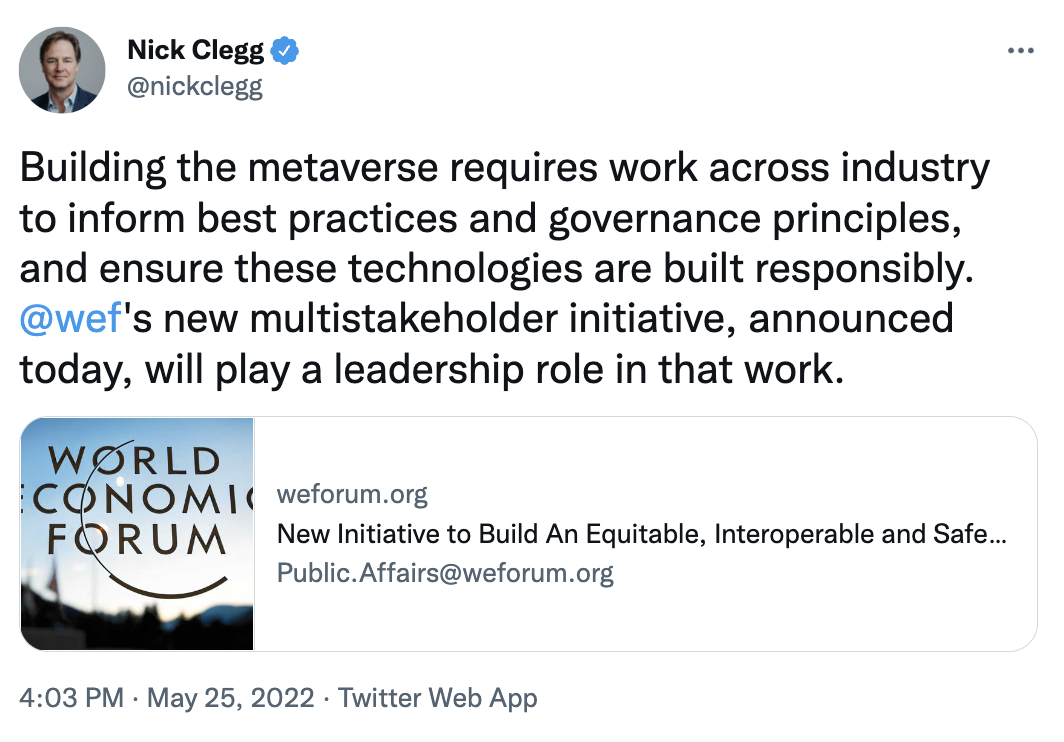Subscribe for free to the America First Report newsletter.
When the World Economic Forum says they’re taking a “leadership role” in anything, it means they’re taking full and unchallenged control. That seems to be the case with the “Metaverse” as Facebook/Meta has announced the WEF’s participation as leaders in the virtual domain.
On the latest episode of The Midnight Sentinel, I covered why this can be a very bad thing. There are three types of people in the eyes of the New World Order. There are the slaves, which will encompass most people if the WEF achieves The Great Reset as they have planned. These people will be totally beholden to and controlled by the powers-that-be, and the Metaverse will likely play a large role in keeping them placated. Some will be compliant but not necessarily controlled. These are the people who are necessary to keep the world operational.
Then, there’s us, the people who will not be compliant and who refuse to be slaves. The New World Order wants us all jailed or dead.
As with all things associated with the World Economic Forum, this new development does not bode well for any of us. Control of the Metaverse means access to the mindshare of the sheep, particularly the younger generations who are spending more and more of their time in virtual worlds rather than the real world.
Not much really changes since Meta CEO Mark Zuckerberg is among the globalist elites, but giving control publicly to the WEF facilitates their actions rather than forcing them to act by proxy.
According to Reclaim The Net:
Meta Announces the World Economic Forum Will Have a Leadership Role in the Metaverse
The World Economic Forum (WEF) is on track to be at the center of defining what the future metaverse will look like by inserting itself in the metaverse’s creation early on.
WEF’s “multistakeholder initiative” wants to assume a leadership role in defining and building the metaverse, Facebook (Meta) President of Global Affairs and former British Deputy Prime Minister Nick Clegg has announced.

The initiative, laid out in a post on the Davos event’s website, is ambitious: it seeks to provide guidance on creating “an ethical, inclusive, economically viable metaverse,” and represent the link between businesses, regulators, civil society, and academia from both the private and public sectors.
“The Defining and Building the Metaverse” wants to focus on producing governance principles for it, but also on something defined as “societal value creation.” The initiative’s first key area is supposed to determine safe, interoperable and “inclusive” technology and environments for the metaverse, while what “value creation” means is not explained.
The post does, however, say that the initiative will provide information about risks and incentives to businesses and society, as well as individuals. And, it will “also outline how value chains may be disrupted, industries may be transformed, new assets could be created and rights protected.”
The WEF appears to want to get involved in the creation, and through governance and regulation, ultimately, control of the metaverse in the early stages of its development. The post recognizes that the concept could go in different directions, and the WEF would like to direct it in a particular one, agreed on by those participating in the initiative.
Currently, their number is over 60, including Big Tech. The post cites statements from stakeholders such as Clegg on behalf of Meta, and top execs from Microsoft, HTC, Sony Interactive, as well as Walmart, CJ Corporation, the LEGO Group, Animoca Brands, and others.
Among the 60 or so stakeholders are not only technology and corporate giants and startups, but also academics and representatives of civil society, the WEF said. What the initiative promises is to give the industry a toolkit for building the metaverse, that is “ethical and responsible” in nature.
According to Nick Clegg, the future metaverse will represent “a force for inclusion and equity.” And Meta doesn’t want to be held too accountable, either.
“It mustn’t be shaped by tech companies on their own. It needs to be developed openly with a spirit of cooperation between the private sector, lawmakers, civil society, academia and the people who will use these technologies,” he said.
It’s unclear from the WEF document, however, how exactly “people who will use these technologies” are represented as stakeholders.
What Would You Do If Pharmacies Couldn’t Provide You With Crucial Medications or Antibiotics?
The medication supply chain from China and India is more fragile than ever since Covid. The US is not equipped to handle our pharmaceutical needs. We’ve already seen shortages with antibiotics and other medications in recent months and pharmaceutical challenges are becoming more frequent today.
Our partners at Jase Medical offer a simple solution for Americans to be prepared in case things go south. Their “Jase Case” gives Americans emergency antibiotics they can store away while their “Jase Daily” offers a wide array of prescription drugs to treat the ailments most common to Americans.
They do this through a process that embraces medical freedom. Their secure online form allows board-certified physicians to prescribe the needed drugs. They are then delivered directly to the customer from their pharmacy network. The physicians are available to answer treatment related questions.







